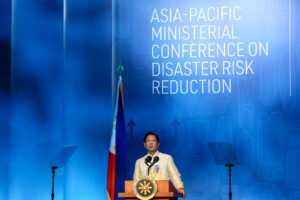By Kyle Aristophere T. Atienza, Reporter
PHILIPPINE President Ferdinand R. Marcos, Jr. on Tuesday urged regional leaders to help advance his country’s green growth financing, particularly the green and blue bond markets, amid the worsening impacts of climate change.
He made the statement as Asia-Pacific leaders gathered in Manila for a four-day conference on disaster risk reduction.
Mr. Marcos said his country has issued guidelines on the issuance of green and blue bonds. “Our green bond market has been recognized by the Asian Development Bank (ADB) for its potential to expand even further,” he said.
He was referring to an ADB survey in 2022 that found institutional investors have limited awareness and resources to expand their green portfolios and underwrite more green bonds.
Mr. Marcos said the country’s “most promising sectors for growth comprise renewable energy, green buildings, sustainable agriculture and water management.”
He said investing in the Philippines’ blue bond market is also essential given the country’s archipelagic nature, which makes it more vulnerable to climate change.
The blue bond market will facilitate the “sustainable growth of industries like fisheries and tourism,” he added.
Mr. Marcos’ remarks send “a strong signal to both big and small businesses, as well as for the general public, to do their share in environmental, social, and governance efforts,” Michael L. Ricafort, chief economist at Rizal Commercial Banking Corp., said in a Facebook Messenger chat.
“To think that the private sector would be willing to engage in these investments without government support is just driving false hope,” Leonardo A. Lanzona, who teaches economics at the Ateneo de Manila University, said via Messenger chat.
He added that investment in disaster- and climate-resilient programs and infrastructure “will involve costs and even higher taxes, which this administration has decided not to do.”
In the ADB survey, respondents agreed on the importance and potential of renewable energy, green buildings, sustainable agriculture, and water management — sectors that the multilateral lender said accounted for majority of investors’ portfolios in the Philippine green bond market.
Mr. Marcos said a southwest monsoon enhanced by Typhoon Gaemi had caused more than $82 million (P4.74 billion) in agricultural damage.
“We must significantly increase our investments and develop financing mechanisms in disaster risk reduction,” he added.
This entails ensuring that developing countries, particularly the least developed ones, landlocked nations and small-island developing states have greater access to these resources to advance their policies and build disaster resilience, Mr. Marcos said.
In the latest World Risk Index, the Philippines, which faces an average of 20 typhoons yearly, remained the most disaster-prone country for a 16th straight year.
Mr. Marcos cited the election of the Philippines as host of the Loss and Damage Fund Board, vowing to improve the board’s operations and to “contribute to the success of its institutional architecture.”
Meanwhile, Mr. Marcos said Malaysia wants closer ties with the Philippines in disaster response and rescue efforts.
Kuala Lumpur could send a special disaster group called SMART team to the Philippines during disasters, his office said after a “productive meeting” with Malaysian Deputy Prime Minister Zahid Hamidi in Manila late Monday.
“We talked about how both our nations can work together to strengthen disaster resilience and develop skilled workforces, in line with technological advances through technical education,” Mr. Marcos said.
Citing the huge number of Filipino workers overseas, he said the Philippine government has adopted skill training for plumbers, electricians and carpenters.
Mr. Hamidi, for his part, said Malaysia wants to learn from the Philippine education system, particularly its technical and vocational education and training.


















